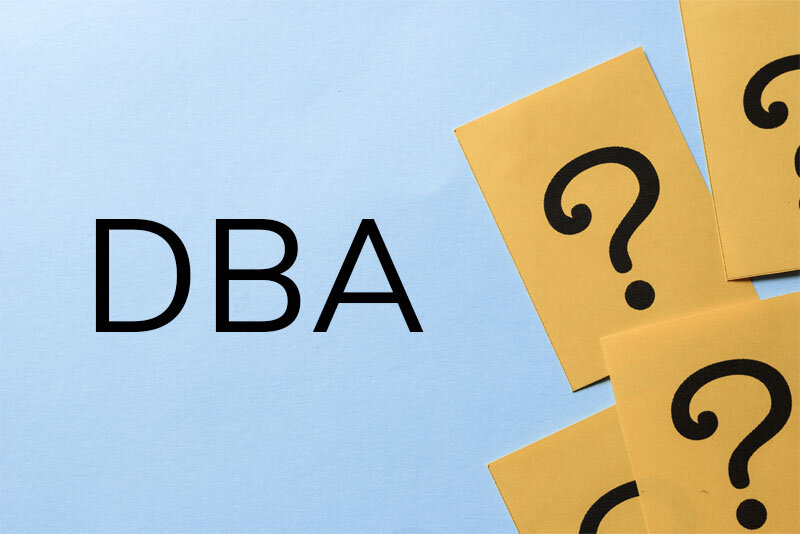A Doing Business As (DBA) name—sometimes called a fictitious business name, assumed name, or trade name—is necessary when conducting business under a name other than a company’s legal name. DBA laws help protect consumers by ensuring the public has a way of knowing who the individual or company behind a fictitious name is.
You might wonder…if you use your own personal name as your business name, do you need to register it as a DBA name? The short answer is: If the business owner’s name is considered the legal name of the company, then a DBA is not required.
But when is that the case?
Legal Business Name vs. DBA by Entity Type
A company’s legal name is the name by which it is legally allowed to carry out its business activities and enter into contracts. It is the business’s official name that appears on government documents and legal forms. How a company’s legal name is determined depends on its business structure. Business owners may find that their company’s legal name may or may not be adequate for successfully marketing their services and products. In that situation, they may decide to use a fictitious name.
Sole Proprietorships and Partnerships
When a business is owned by one person (or a married couple), it is considered a Sole Proprietorship—unless the owner completes the process of registering it as a formal business entity like a Limited Liability Company (LLC) or Corporation). A Sole Proprietorship and its owner are the same legal entity. Therefore, the legal business name is the owner’s full first and last name, which may have a descriptor added to it to describe the business activities, such as “June Ramirez Graphic Design” or “Cody Owens Lawn Care.” Many of the nearly 30 million businesses that operate as Sole Proprietorships in the United States choose to use their owner’s name as their business name, but others may find that doing so limits their branding potential. Registering to use a fictitious name allows the business owner to market their services or products under a name that does not include their first and last name. It enables them to get more creative with their business branding. For example, June Ramirez might file a DBA for the name “Pinnacle Marketing Design” for her graphic design business and Cody Owens might use the trade name “Good-n-Green Lawn and Landscape Care” for his lawn care company.
If a company has multiple owners and hasn’t registered as a formal business entity, it is considered a General Partnership. A General Partnership’s legal name must include the last names of each of its owners—for example: “Lee, Johnson, and Patel IT Consultants.” If the owners prefer a catchier name, they might file a DBA for something like “Triple Peace of Mind IT Consulting.”
As you can see, registering a fictitious name gives Sole Proprietorships and General Partnerships more control over how prospective customers might perceive their brand—and how memorable the brand will become.
LLCs and Corporations
An LLC or Corporation’s legal name is the one that appears on the entity’s formation documents filed with and approved by the state. LLCs and Corporations do not have to include their owners’ names in their legal name. So if our hypothetical sole proprietor June Ramirez forms an LLC, she could register “Pinnacle Marketing Design, LLC” as the company’s legal name in the Articles of Organization she submits to the state. (Of course, she should first do a business name search to make sure the name isn’t already taken by another business entity.) Likewise, if our hypothetical partners Lee, Johnson, and Patel decide to incorporate as a C Corporation, they could establish “Triple Peace of Mind IT Consulting, Inc.” as their entity’s legal name. In either case, no DBA would be required to use those names even though they do not contain the owners’ names.
However, if an LLC or Corporation intends to conduct business using a name other than the entity’s legal name, it must file a DBA. This is true whether the name is completely different or a variation of the legal name. For example, if Triple Peace of Mind IT Consulting, Inc. wants to market its services to mitigate cybercrime risks under “Triple Peace of Mind Cybersecurity Protection,” it must complete a fictitious name registration.
There are several reasons why an LLC or Corporation might want one or more DBAs:
- Operate multiple businesses under a single LLC or Corporation – This is more cost-effective than forming separate entities for each business. However, the LLC or Corporation is responsible for all of those businesses’ legal and financial obligations.
- Operate as a franchisee – Suppose Jane Doe is opening a Rita’s water ice franchise location. She might set up an LLC under the legal name “Doe Enterprises, LLC” and then file a DBA for “Rita’s Italian Ice” (or another name allowed per her franchise agreement).
DBA Name Restrictions
States’ rules vary about what can or cannot be included in a business name. Their restrictions are meant to prevent the public from being misled. For instance, a fictitious name cannot include words, acronyms, or abbreviations like Corporation, Limited Liability Company, Inc., or LLC because it would give a false impression that the DBA name is a registered business entity. Likewise, terms that imply a company is a governmental unit—such as Federal or United States— are generally forbidden.
Examples of other possible taboo words include:
- Bank
- Foundation
- Trust
- University
- School
- Law
- Doctor
- Engineer
- Any words that are obscene or that promote illegal activity
If you’d like to learn more about business name restrictions, we have a great article on the subject at Business Name Restrictions: What to Know Before Registering Your Business.
Pros and Cons of Using a DBA
Generally, fictitious name registration involves filing a form with the state’s Secretary of State office. However, sometimes DBA filings are done through the county. When a company files a DBA with the state or county, it must typically place a notice in a local newspaper or legal publication to inform the community of the assumed name and who has applied for it.
There are advantages and disadvantages of fictitious names.
Pros of using a DBA:
- Allows you to be more creative and set the foundation for a memorable brand.
- Adds an essence of professionalism.
- Is less expensive to set up and maintain than a separate business entity.
- Enables entrepreneurs to keep entity compliance obligations simple and cost-effective while marketing different products, services, or business lines under distinct names.
- Offers some privacy for sole proprietors and general partners who don’t want to put their names on display when marketing their business products and services.
- May be used in contracts and on bank accounts. Typically written out as legal business name + DBA or d/b/a + fictitious name. For example, June Ramirez DBA Pinnacle Marketing Design.
Cons of using a DBA:
- Does not guarantee exclusive use of the name.
- Does not provide personal liability protection for the business owner (because a DBA is not a registered business entity).
- Less tax flexibility than a registered business entity.
Discussing your options with an attorney can help ensure you make the right decision for your business.
Need a DBA for your Business?
No matter where your business is located in the United States, our filing specialists will seamlessly handle your DBA registration. Enjoy peace of mind that your filing will be done quickly and accurately.





